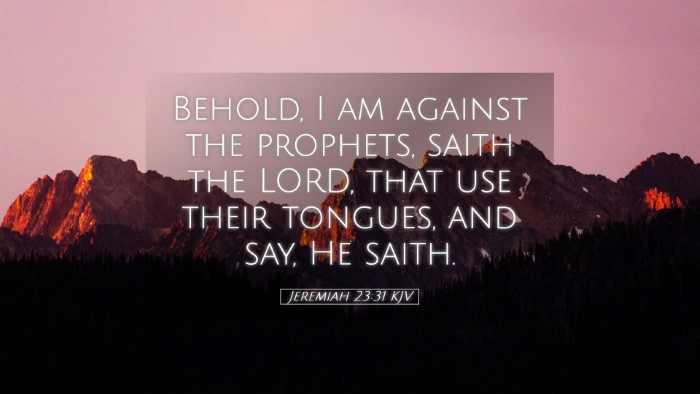Commentary on Jeremiah 23:31
Bible Verse: Jeremiah 23:31 - "Behold, I am against the prophets, saith the Lord, that use their tongues, and say, He saith."
Introduction
This verse highlights God's judgment against false prophets—those who presumptuously claim divine authority. The context of Jeremiah's prophecy reveals a critical examination of both authentic and counterfeit voices within Israel. It serves as a stark warning for those who mislead God’s people.
Contextual Background
Jeremiah’s prophecies emerge in a tumultuous period for Israel, characterized by moral decay and disobedience to God’s law. During this time, many prophets claimed to speak on behalf of the Lord, offering comforting messages while leading the people astray. Hence, God’s reprimand in this verse is a necessary call to discernment.
Historical Context
- The reign of King Zedekiah, marked by political intrigue and a lack of true leadership.
- The prevalence of false security among the people, believing in deceptive prophecies about peace and prosperity.
The Divine Authority and Prophetic Responsibility
The phrase “I am against the prophets” signals that God directly opposes those who falsely claim His word. This serves as a reminder of the solemn responsibility that comes with prophetic ministry. Alluding to Matthew Henry, the role of a prophet is not one of personal ambition but of divine stewardship.
Key Insights from Commentators
- Matthew Henry: He notes that these prophets use their tongues deceitfully—promoting their own agendas rather than declaring God’s true message. Henry asserts that this dishonesty incurs divine judgment.
- Albert Barnes: Barnes emphasizes the gravity of misusing God’s name. He observes that claiming divine endorsement for one’s own thoughts constitutes a major transgression and implies accountability before God.
- Adam Clarke: Clarke highlights the danger posed to the people by these prophets, indicating that their words can lead to spiritual destruction. He suggests that genuine prophets must avoid false prophecies, as they threaten the spiritual integrity of the community.
The Nature of False Prophecy
Understanding the characteristics of false prophecy, as delineated in this verse, is crucial for contemporary application. False prophets manipulate the truth for personal gain or societal acceptance. This underscores a need for vigilance and discernment within the church today.
Characteristics of False Prophets
- They often speak with smooth words, appealing to human desires.
- They promote self-interest rather than divine instruction.
- They create a false sense of security, as seen in Jeremiah’s context.
Theological Implications
The assertion “I am against the prophets” extends beyond a mere rebuke. It reveals God’s commitment to uphold His truth and integrity amongst His people. False prophecies are considered serious violations against divine revelation and can lead believers astray.
God's Protective Judgment
God’s opposition to false prophets can be understood as a protective measure for His people. By exposing the deceitful claims of false prophets, God seeks to safeguard His flock by aligning them with authentic representations of His will. This reflects God’s character as a shepherd who cares deeply for His sheep.
Practical Application for Believers
This verse calls for introspection and vigilance among modern believers. It serves as a reminder to test the spirits, discern true from false teaching, and ground oneself firmly in the Scripture.
Recommendations for Healthy Discernment
- Regularly engage with the Bible as the ultimate source of truth.
- Seek guidance from prayer before accepting teachings or prophetic words.
- Encourage community discussions about teachings in light of Scripture.
Conclusion
Jeremiah 23:31 offers profound insights regarding the nature of prophetic ministry, the seriousness of false claims, and divine expectations for believers. As we navigate our spiritual journey, let us commit to authenticity in our relationship with God and pursuethe truth found in His Word.


